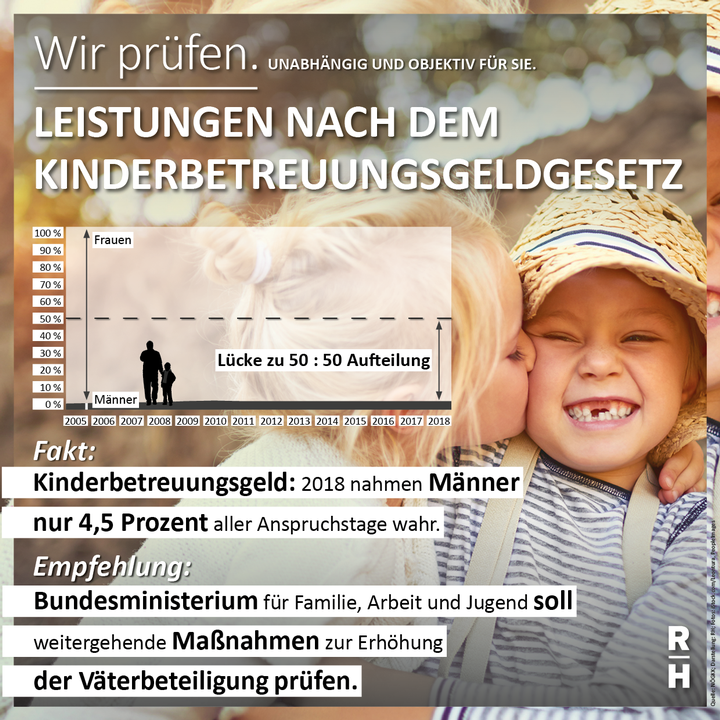Childcare allowance: merely 4.5 per cent of the days claimed can be attributed to men

Less than five per cent of the days claimed and approved can be attributed to men. This is disclosed by the Austrian Court of Audits’ (ACA) report published today on the "Benefits Pursuant to the Childcare Allowance Act" (in German). The difference between this figure and the often-published figures concerning the share of fathers can be explained as follows: the Federal Ministry for Families, Labour and Youth calculated the percentage of all those fathers who benefited from childcare allowance. In 2017, for example, the fathers’ share accounted for 19.4 per cent. The ACA, however, used for its analysis the exact days for which women and men had claimed childcare allowance.
Extreme inequality
In 2018, some EUR 1.2 billion were paid to about 130,000 eligible persons pursuant to the Childcare Allowance Act (Kinderbetreuungsgeldgesetz). One of the act’s objectives is to promote the reconciliation of family and work life. However, the effective lessening of the burden on women and a more equitable sharing of care responsibilities was not attained. Although the temporal share of men as regards the claiming of childcare allowance increased from 3.3 per cent to 4.5 per cent in the period of 2005 to 2009, the figures have come to a standstill since then. Also in 2018, men claimed as few as 4.5 per cent of all eligible days. The distribution of the days claimed by women and men remained therefore “extremely unequal”, as stated in the report. Fathers, by the way, made use of childcare allowance predominantly in the months of July and August.
The ACA recommends to the ministry to evaluate the adoption of more far-reaching measures to increase the share of fathers.
Long processing time
The social insurance providers were responsible for the settling of childcare allowance. The ACA criticizes that the ministry failed to systematically control the administrative processing. The ministry assumed that the average processing time amounted to 28 days, with no waiting times or payment gaps between maternity and childcare allowance. In the exemplary cases examined by the ACA via a risk-oriented approach, the average processing time was at 45 days for domestic cases and 211 days for cross-border cases. Delays were due to waiting times in the case of queries to applicants or to other authorities, but also due to internal processes of the social insurance providers. The ACA recommends to the Austrian state health insurance provider, the Österreichische Gesundheitskasse, to take measures to reduce the processing time. The ministry should collect and analyse corresponding control indicators on a regular basis.
Considerable need for advice owing to complex legislation
In their report, the auditors furthermore point to the fact that an optimal provision of benefits pursuant to the Childcare Allowance Act requires “precise knowledge on the complex legal bases”. Without help, the citizens were often overwhelmed. In the spirit of providing added value for the citizens, the ACA recommends to the ministry and the Österreichische Gesundheitskasse to adapt the information and advice offered to the parents more to the needs of the latter.
- pdf Datei:
- 2,705.8 KB
- Umfang:
- 98 Seiten


